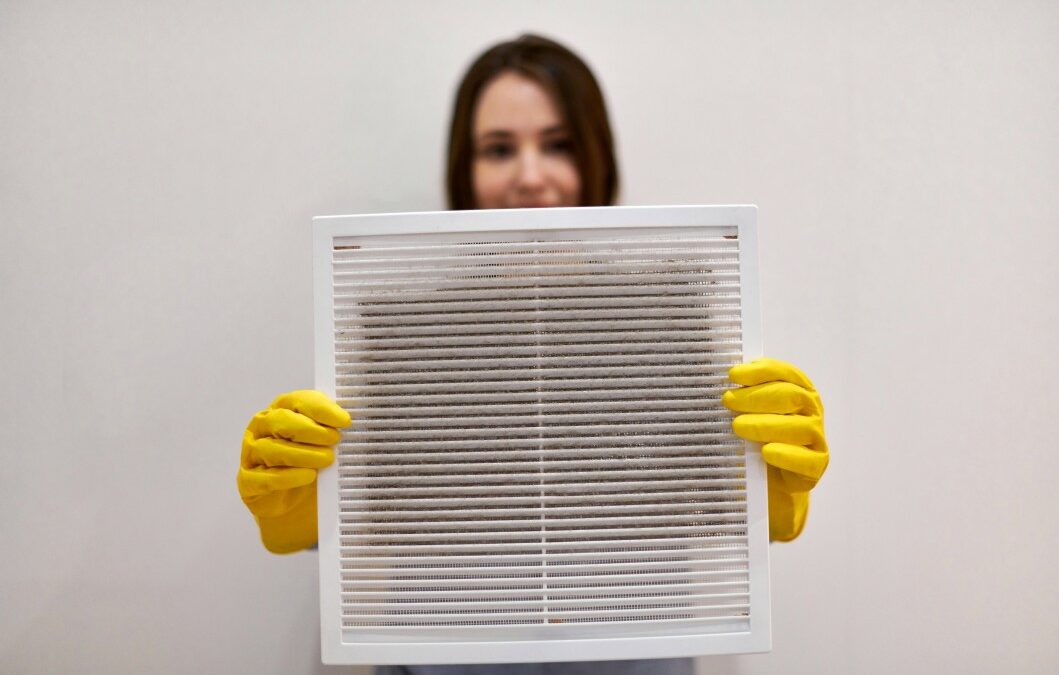If you’ve made the investment to update your old, worn-out HVAC system, you understand how important air quality is for your home. But your HVAC can only be effective if you use quality air filters that match the needs of your home or business. By identifying your specific air quality needs, you can find the air filter that maximizes the capabilities of your HVAC system.
Below is an overview of how to understand the different types of filters available and how to best match the wide range of options with your system.
How the MERV scale works
Air filters are measured on a scale known as the Minimum Efficiency Rating Value, or MERV. This scale ranges from 1-20, and air filters are tested six times by organizations and manufacturers to determine their MERV rating.
Air filters that capture large dust particles rate a MERV score between 1 and 4. As the rating goes up, the more it’s capable of trapping increasingly smaller particles. Filters with a MERV rating between 8 and 12 are most often recommended for residential use. Filters with a MERV rating from 13 to 16 are commonly used for commercial or industrial HVAC systems.
Air quality needs for your home
The air quality needs for your home can depend on a wide range of factors, including:
- Health concerns
For allergy sufferers, a highly effective filter specific for allergens (such as mold spores or pollen) can be a game-changer for the air quality in your home or business. - Energy efficiency
Restrictive air filters can degrade the efficiency of your HVAC system, so you might need to find a balance between effective filtration and the efficient operation of your equipment. - Prioritization
If you have a specific pollutant you need to be filtered from your indoor air, you’ll want to find filters that can handle your specific needs. - Operational integrity
In some cases, restrictive air filters can overwork your HVAC system and lead to premature equipment failure. - Simplicity of maintenance
Changing your air filters regularly can be easily forgotten among all the things on your to-do list. So, you might want to consider finding a filter that only requires replacement or cleaning once or twice per year.
Different types of air filters
- HEPA filters
High-efficiency particulate air (HEPA) filters can remove at least 99.97% of airborne allergens and pollutants, including mold spores and dust that are as small as 0.3 microns. With a MERV rating nearing 16, HEPA filters are recommended by the U.S. Department of Health and provide the highest protection for your home against even the smallest microns or airborne particles, including tobacco and bacteria.
- UV filters
Ultraviolet, or UV, filters use short-wave ultraviolet light to kill bacteria and viruses. When air passes through the HVAC unit, the UV lamps disinfect it with germicidal radiation. UV filters are excellent for killing microorganisms like mold spores but can be potentially dangerous because they can transform oxygen into ozone, which can be hazardous for your health.
- Electrostatic filters
Electrostatic filters use small cotton and paper fibers to create static that acts as a magnet for dust and other airborne particles. These filters are a great option for allergy sufferers because the magnetism generated by these filters is strong enough to keep harmful particles from spreading throughout your home.
- Washable filters
Washable filters are an environmentally friendly way to save money. The initial price of this air filter type for HVAC systems is high, but it should be viewed as an investment that will last for many years. However, washable filters need to be regularly maintained for them to work effectively.
- Media filters
Media filters are very easy to maintain and great for filtering bacteria and other small airborne pollutants. They can provide the same level of filtration as a high-MERV filter but without the negative consequences of airflow or static pressure.
- Spun glass filters
Using strands of fiberglass woven together, these air filters make for one of the best AC filter types because they’re cost-effective, disposable, and protect air conditioners and furnaces from debris.
While spun glass filters are effective, they aren’t recommended for people who have respiratory problems and need a filter that will improve the indoor air quality because they cannot strain as many air pollutants as other filters.
- Pleated filters
The pleats in pleated filters give them an advantage over non-pleated options because they increase the filter’s surface area for better filtering. Thus, the higher the number of pleats in the filter, the greater it will be at filtering allergens and pollutants from the air. Pleated filters are typically made from polyester fabrics or cotton folds and have a MERV rating between 5 and 13.
HVAC Company in Knoxville, TN
Choosing a proper filter for your HVAC system is essential to its effectiveness for your specific needs. With a wide range of filter options, it’s best to educate yourself as much as possible to make sure you’re choosing the right filter for your system. You may want to consider consulting with an HVAC service provider for the best insight into your system.
Another way to ensure your HVAC is providing the highest indoor air quality for your home or business is to have your system serviced annually by a licensed and experienced technician. At City Heating and Air Conditioning, we offer an annual service plan that’s unrivaled in East Tennessee. Whether your heating and cooling system needs routine maintenance or you’re ready for a new HVAC installation, City Heating and Air Conditioning has everything you need as the seasons change and warmer weather heads our way.
We’re proud to provide Knoxville, TN, and the surrounding communities with exemplary heating and cooling services and have worked hard to build a reputation of outstanding customer service and satisfaction. Our HVAC company offers HVAC maintenance, installation, and repairs for a variety of HVAC systems. Learn more about our HVAC services by calling us today at 865-938-1005.

